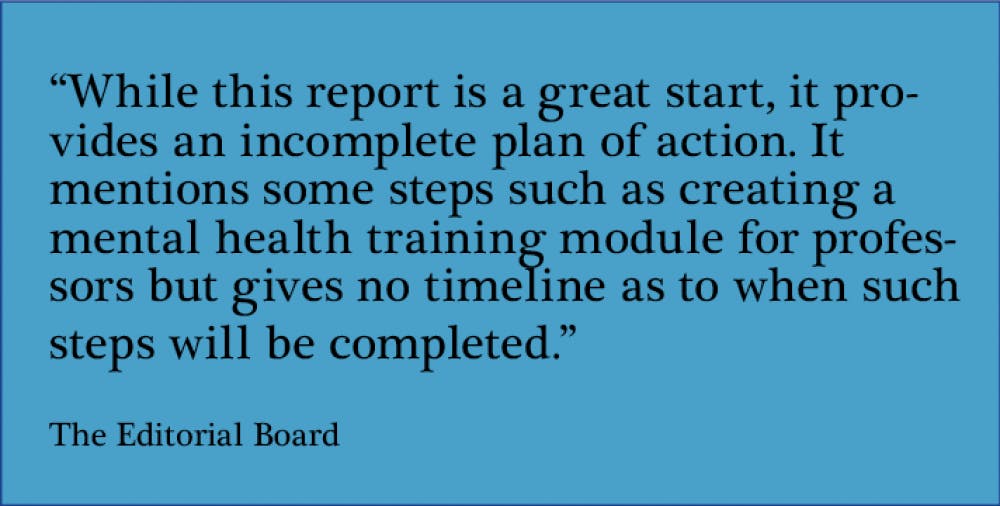Responding to pressure from students in 2016, the University began a thorough review of the status of mental health across all nine Hopkins schools. At that time, they formed the Task Force on Student Mental Health and Well-being which is comprised of 28 faculty, staff and students. Last week, the Task Force released their formal report, which included the findings from a 2016 mental health survey and recommendations on how to improve University resources.
Out of the 16,014 students who received the survey, 2,260 responded. We acknowledge that the data reflects the views of a self-selecting group and that may skew the results. However, we believe that the findings resonate with many students’ experiences and could lead to important discussions about how to improve mental health services at Hopkins.
We would like to first thank the members of the Task Force for meticulously combing through the data and dedicating their time to helping the University better understand the emotional and psychological strain that many of its students experience.
While this report is a great start, it provides an incomplete plan of action. It mentions some steps such as creating a mental health training module for professors but gives no timeline as to when such steps will be completed.
This report also highlights some alarming statistics about the mental health of our fellow students. According to the survey, Hopkins students pull more all-nighters and are more anxious about their futures than students from other colleges. From 2016 to 2017, the Counseling Center provided 8,214 individual sessions to students. This number comes in comparison to the 3,376 individual sessions provided at other similarly sized schools.
From the survey’s respondents, about 30 percent of undergraduates, 25 percent of professional students and 15 percent of graduate students reported having seriously considered suicide. We are saddened that this is the reality students at Hopkins face. This statistic only underscores that there is important work to be done.
From their findings, the Mental Health Task Force proposed three broad recommendations: promote a climate of awareness and support, improve mental health care from providers like the Counseling Center, and offer or require mental health awareness training for faculty, staff and students.
Many past initiatives and messages promoting mental health have been out of touch with the student experience. For example, yard signs on the quad reminding us to get eight hours of sleep and exercise regularly are almost laughable considering the amount of work expected from most Hopkins students. We hope that new campaigns can do a better job of realistically communicating resources and advice to students.
Additionally, we agree with the suggested improvements for the Counseling Center. Average wait times for appointments are currently about a week and its current operating hours are inconvenient for students who have class during the day. Hiring additional counselors and expanding available hours will improve the Counseling Center’s accessibility to the student body.
We believe that implementing mandatory mental health training modules for faculty members is a crucial step in helping them better understand the pressures that students face.
Many students cited that there was a “toxic culture” at Hopkins. Though the report does not pinpoint where this “toxic culture” comes from, the statistics reveal that the majority of student stress comes from managing their academic workload.
The report should have been more explicit that this “toxic culture” is tied to the pervasive academic pressure that students feel. Professors can play a huge role in addressing this problem and educating them about our University’s current mental health resources would be extraordinarily beneficial for students.
Overall, we are unsure of how consequential the suggested recommendations from the Task Force will be. However, we are hopeful that the University is taking the step in the right direction in beginning to confront these issues. Small changes — whether it is a professor moving back an exam date or changing their grading curve — can lead to meaningful improvements in students’ lives.
The Task Force has presented a series of steps that the University can take to begin its process of addressing mental health. However, without a concrete plan for when these initiatives will take place, the problems outlined in the report will only persist.
We encourage the University to give us a clear timeline for when these recommendations will be implemented. This is only the beginning of addressing mental health on campus. There is a lot more work to be done.

















